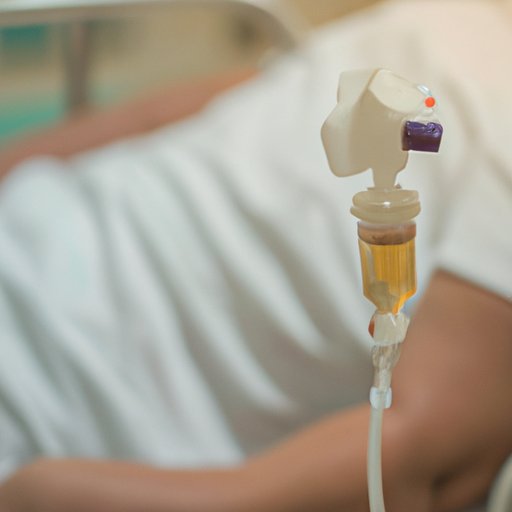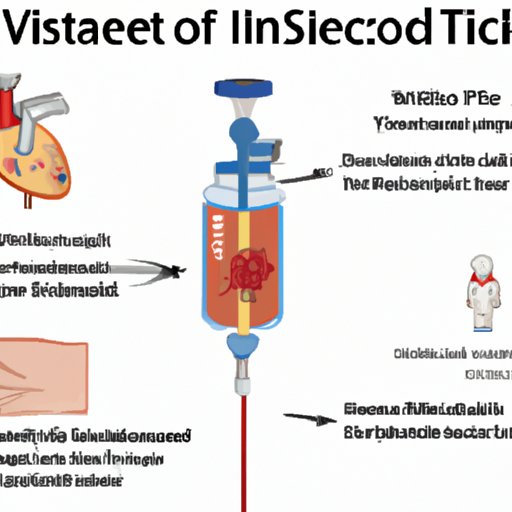
I. Introduction
Small vessel ischemic disease is a condition wherein the small arteries and arterioles that supply blood to the brain become narrowed or blocked. This decreases blood flow to the brain and can lead to a wide range of symptoms such as problems with memory, speech, and balance. In this article, we will explore the different treatment options available for small vessel ischemic disease and how to manage its symptoms
II. Small Vessel Ischemic Disease: Understanding and Managing the Symptoms
Small vessel ischemic disease can be difficult to diagnose, as symptoms can vary from person to person. Common symptoms include difficulty with memory, problems with speech and communication, mood changes, and difficulty with balance and coordination. Early detection and management of these symptoms is important to prevent the condition from worsening and to improve quality of life.
III. How to Treat Small Vessel Ischemic Disease: A Comprehensive Guide
The treatment of small vessel ischemic disease typically involves a combination of medications, lifestyle changes, and physical therapy. The goal of treatment is to improve blood flow to the brain, prevent further damage, and reduce the risk of complications.
Different types of treatment options available
Medications that can be used to treat small vessel ischemic disease include antiplatelet agents, which help to prevent blood clots from forming, and anticoagulants, which help to prevent blood clots from getting larger. Blood pressure medications may also be prescribed to help lower blood pressure and reduce the risk of further damage to the small blood vessels in the brain.
Importance of medication management
It is important to take medications as prescribed by your doctor and to follow up regularly with your healthcare provider to monitor the effectiveness of the medications. In some cases, adjustments may need to be made to the dosage or type of medication being taken.
Role of diet and lifestyle changes
Dietary changes, such as reducing salt and increasing intake of fruits and vegetables, can help to lower blood pressure and reduce the risk of complications. Exercise can also be beneficial in improving blood flow and reducing the risk of further damage to the small blood vessels in the brain.
Physical therapy and exercise for small vessel ischemic disease
Physical therapy can be helpful in managing symptoms of small vessel ischemic disease, such as problems with balance and coordination. Your healthcare provider can refer you to a physical therapist who can develop an exercise program tailored to your specific needs and abilities.

IV. Small Vessel Ischemic Disease: The Latest Treatment Options
There is ongoing research into new treatment options for small vessel ischemic disease. Some promising areas of research include stem cell therapy and gene therapy. However, these treatments are still in the experimental phase and are not yet widely available. As with all treatments, it is important to discuss the benefits and potential risks with your healthcare provider before making any decisions.
New research and advancements in treatment for small vessel ischemic disease
Recent research has focused on developing treatments that work by improving blood flow to the brain, such as ultrasound treatments and stent-assisted angioplasty. While these treatments hold promise, more research is needed to determine their long-term effectiveness.
Benefits and risks of these new treatments
As with any medical treatment, there are risks and benefits to consider. It is important to discuss these with your healthcare provider before making any decisions.
Discussion of alternative treatments and their effectiveness
There are a number of alternative treatments that are sometimes recommended for small vessel ischemic disease, such as acupuncture and herbal remedies. While some people may find these treatments helpful, there is little scientific evidence to support their effectiveness.
V. Overcoming Small Vessel Ischemic Disease: Effective Strategies and Treatment methods
Coping with the symptoms of small vessel ischemic disease can be challenging, but there are strategies that can help.
Coping strategies for small vessel ischemic disease
It can be helpful to develop coping strategies to manage the emotional impact of small vessel ischemic disease. This may include talking to a therapist or counselor, joining a support group, or practicing relaxation techniques such as meditation or yoga.
Support groups and resources available
There are many resources available to those living with small vessel ischemic disease, including support groups and online forums. These can be a great source of information and emotional support.
How to maintain a positive attitude and outlook
Maintaining a positive attitude and outlook can be difficult when living with a chronic illness, but it can help to improve quality of life. Try to focus on the things that you can still do, and celebrate your successes along the way.
VI. Small Vessel Ischemic Disease: What We Know About Treatment So Far
While there is still much to learn about small vessel ischemic disease, current treatments can be effective in managing symptoms and reducing the risk of complications.
Review of current treatments and their effectiveness
Current treatment options, such as medication management and lifestyle changes, can be effective in improving quality of life for those living with small vessel ischemic disease.
Why early diagnosis and treatment is important
Early diagnosis and treatment is important to prevent further damage to the small blood vessels in the brain and to improve quality of life.
Discussion of future research and potential cures
There is ongoing research into new treatments for small vessel ischemic disease, including stem cell therapy and gene therapy. While these treatments hold promise, more research is needed to determine their safety and effectiveness.
VII. Managing Small Vessel Ischemic Disease: Tips and Best Practices for Treatment
There are a number of strategies and best practices that can be helpful in managing small vessel ischemic disease.
Successful lifestyle and dietary habits for managing symptoms
Some helpful lifestyle and dietary habits include quitting smoking, maintaining a healthy weight, and staying physically active.
Tips for adhering to medication regimens
It can be challenging to remember to take medications as prescribed, but there are strategies that can help. These include setting reminders on your phone or using a pill organizer.
Coping with the emotional impact of small vessel ischemic disease
Coping with the emotional impact of small vessel ischemic disease can be difficult, but it can help to talk to a therapist or counselor or join a support group.
VIII. Conclusion
Small vessel ischemic disease can be a challenging and debilitating condition, but there are treatments available to manage symptoms and improve quality of life. By working closely with your healthcare provider and making lifestyle changes, you can take control of your condition and maintain a positive outlook on life.





